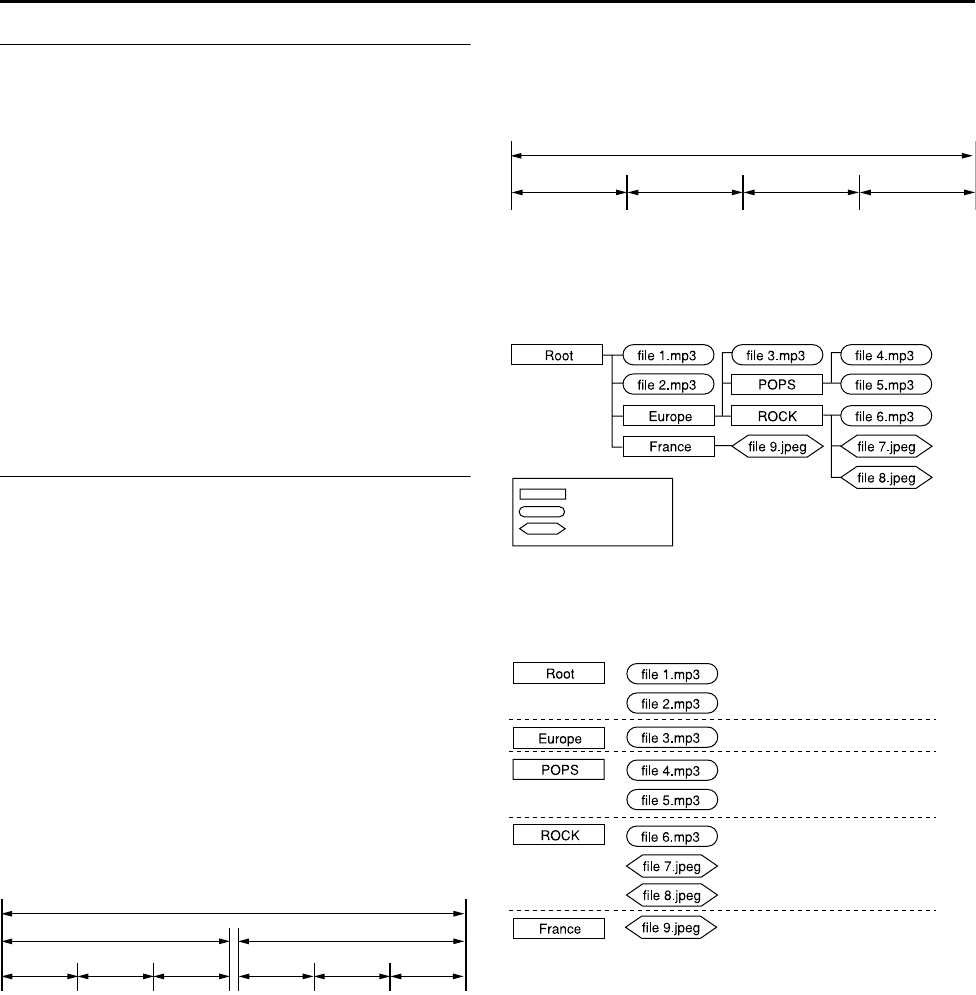
DISC INFORMATION
Page 4Friday, 8 April 2005 16:00
Filename [TH-R1R3EK_04DiscInfo.fm]
Masterpage:Left+
4
Recording Medium And Format
DVD-RAM
● Recording and erasing can be performed as many times as
possible on a disc.
● Editing can be performed after recording, such as deleting
unwanted parts.
● While recording, it is possible not only to start playback of a
programme currently being recorded, but also to watch another
programme previously recorded.
DVD-RW (VR mode)
● Recording and erasing can be performed as many times as
possible on a disc.
● Editing can be performed after recording, such as deleting
unwanted parts.
DVD-RW (Video mode)
● Can be played back on other DVD players after finalising.
● New recording can be performed by erasing all the data on a disc
once played back.
DVD-R
● Can be played back on other DVD players after finalising.
● Suitable when keeping a recorded disc for a long time.
File Structure Of Discs
DVD VIDEO
Typically, DVD VIDEO discs are made up of larger units called
AtitlesB. Each title has a number (title number) that can be used to
select desired titles. Titles are further divided into units called
AchaptersB. Each chapter has a number (chapter number) that can
also be used to select desired chapters. Note that some discs are
not divided into titles and chapters.
When you record a programme on a DVD-RAM/RW (VR mode)
disc
A single recording session results in a single title. In addition,
chapter marks are automatically inserted when recording is
paused. It is also possible to insert chapter marks at desired
locations during playback. (A pg. 29)
When you record a programme on a DVD-R/RW (Video mode)
disc
A single recording session results in a single title. In addition,
chapter marks are automatically inserted when recording is
paused. It is also possible to insert chapter marks at desired
locations during playback. Once the disc has been finalised, these
chapter marks are deleted and new chapter marks are assigned
automatically approximately every 5 minutes.
● In Video mode, even before finalising, it is impossible to perform
editing operations other than changing the disc name and/or title
names and deleting programmes and/or titles.
● After finalising, it is impossible to perform editing operations.
Audio CD/Video CD/SVCD
Typically, Audio CD discs are divided into separate tracks each
containing one song. Each track is assigned a number. For
example, the third track is Track 3. The same is true for Video CD/
SVCD discs.
However, some discs are not divided into tracks.
JPEG/MP3 Disc (CD-R/RW/ROM)
MP3/JPEG files put in directories nested in several levels on a disc
will be organized as if they were put in single level directories
(groups) by the MP3/JPEG Navigation of this unit. (A pg. 63)
File structure of a disc before starting the MP3/JPEG
Navigation
File structure of the disc after starting the MP3/JPEG
Navigation
Files are automatically grouped as follows and displayed on the
MP3/JPEG Navigation screen. Data is displayed in the
alphabetical order of file name. Files are grouped based on roots.
● This unit can recognise up to 9 hierarchies including directories
and files.
Also, it can recognise up to 250 files in each group, and up to
99 groups on a disc.
NOTES:
● Video CD/SVCD discs that support Playback Control (PBC)
The contents of a disc are recorded into several hierarchies, and
played back according to the instructions on the screen while
navigating through the hierarchies. It is also possible to playback
recorded tracks consecutively without activating the PBC function
even when playing a PBC-compatible disc. (A pg. 30)
● Regarding the contents recorded on discs
Some files may not be played back depending on the file types
and other factors.
DVD-RAM, DVD-RW, DVD-R or DVDVIDEO disc
Title1 Title2
Chapter 1 Chapter 2
Chapter 3
Chapter 1
Chapter 2
Chapter 3
Audio CD/Video CD/SVCD
Track 1 Track 2 Track 3 Tra ck 4
Directory
MP3 file
JPEG file
TH-R1R3EK_00.book Page 4 Friday, April 8, 2005 4:00 PM


















